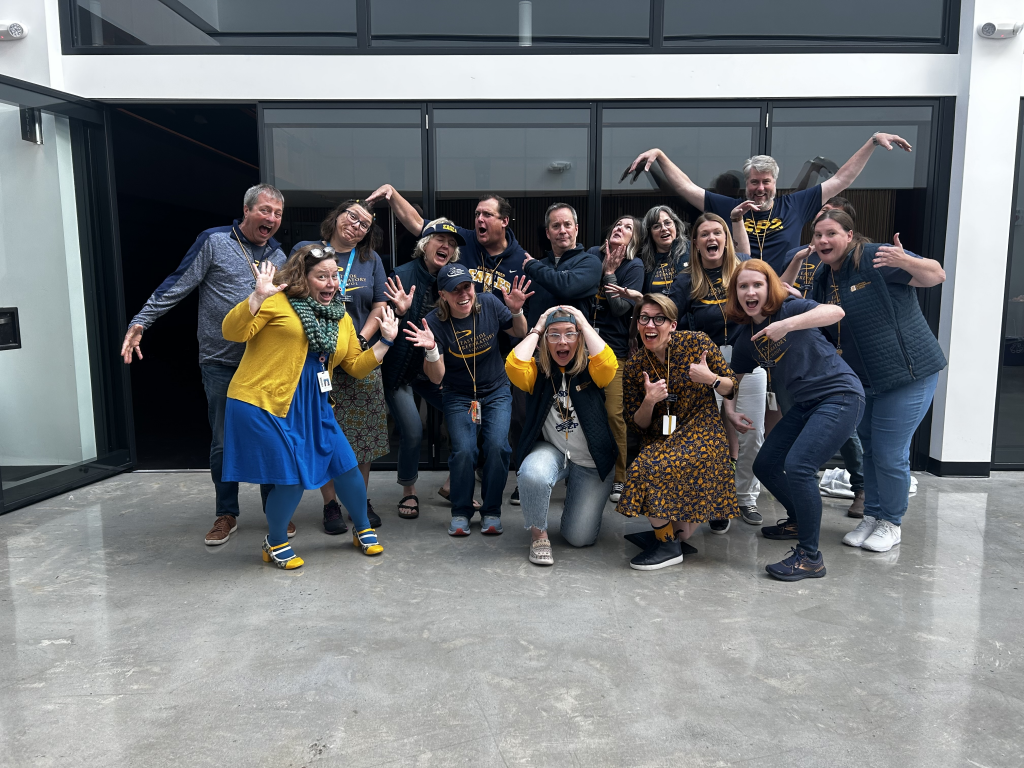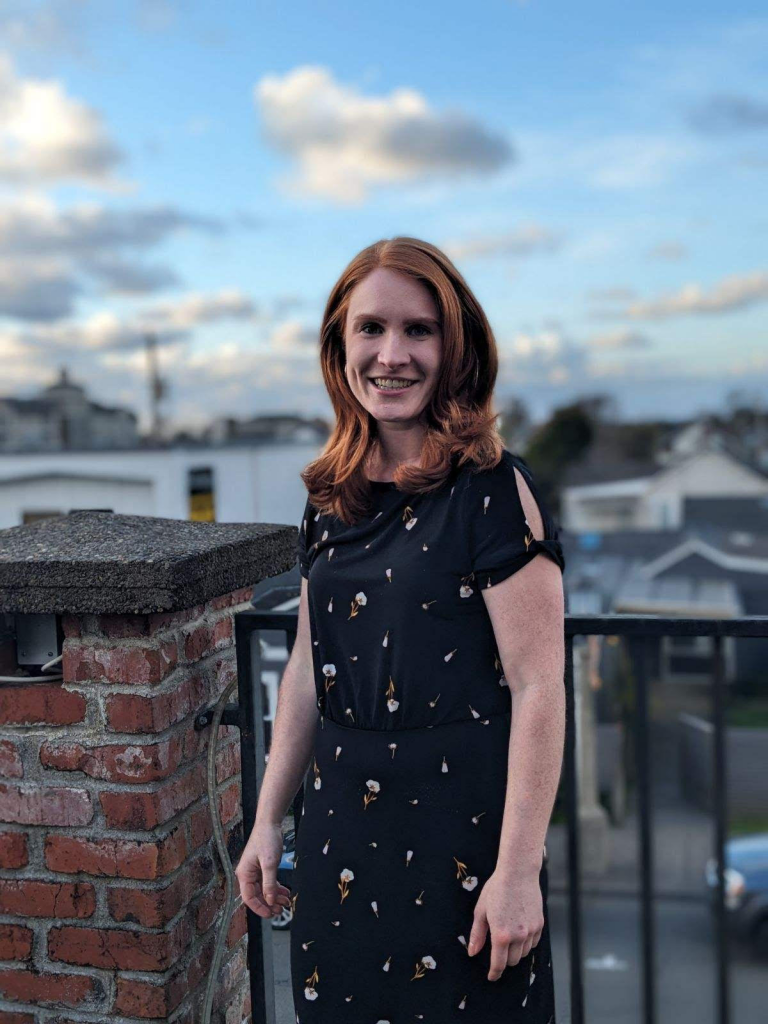Overview
“I would like share how much I enjoy working with and around Katie Meredith! She is always kind, thoughtful, generous, and humble. I hope she’s here leading the growth and success of EPS well past most of the rest of us.” -Scott Hockert
As I conclude my PDP, I return to the initial questions that emerged at the beginning of my process. With my facilitator, I started thinking about how development in my role allows me to contribute to the future of the Advancement Team. I also wanted to focus on how my development can contribute to the current and future needs of the school. As I think about the future of the Advancement Team and what it could look like, I can see how it would be beneficial for me to continue developing my professional skills in advancement, communications, and alumni relations which could be applied to a variety of Advancement roles. As I develop more advanced leadership skills, these would be equally beneficial in a leadership or executive assistant role, if one of those roles becomes part of my professional trajectory in the future.
Over the years, the school has grown significantly and has increased the number of enrolled students each year. As a result, there are more parents in the community and families to engage than ever before. In addition to our Annual Fund, we have added an Endowment Fund, which has increased the number of donations that we receive on an annual basis. We are starting to ask alumni to give as well. Due to an increase in constituents to engage, the scope of the work for the Advancement team has expanded, possibly beyond what can be done effectively by a team of two people. In the future, I could see the Advancement team growing and our structure expanding to better serve the needs of EPS community.
Areas of Growth
“Leaning into the PDP is a great indicator of growth for Katie. I’m looking forward to her presenting her PDP work at the close of the year so that the broader community gets insight into the quality thinking and work she does and how much she cares about the EPS community. I do not witness her work in the Admin Council, but I see that as a great venue for her to expand her influence as a leader and getter-of-things-done.” -Matt Delaney
To return to a key concept from my introduction, awareness itself does not lead to growth. Awareness is not the path of growth, rather, it is our initiator. Beyond awareness, we step into challenges, vulnerability, and discomfort, which is where growth can actually occur. This PDP process has helped me gain awareness of my strengths and weaknesses, and in conclusion I will think about ways I can continue to grow. I found the NWAIS conference tied into some of the same concepts that I read about in “Managing Leadership Anxiety” when the first keynote discussed the gap between a stimulus and a response. Then, I was challenged to think about the gap between what is in my control and what is not in my control (“The Let Them Theory”). An area of growth for me is having hard conversations with people or telling them something that they don’t want to hear. Using the STOP acronym from the conference, I can stop, take a breath, observe my emotions, and proceed into those difficult conversations. I learned the value of not judging myself or others but instead to recognize emotions as they arise. I learned how to listen better – to focus on not only the content of what the person is sharing but also hearing the emotions underneath their words. I hope to continue growing in curiosity and empathy in all my interactions, but especially in the most difficult ones. I want to continue growing in asking questions and listening without judgement rather than making assumptions about people as I engage and collaborate with them.
Managing Leadership Anxiety
“I would love to see Katie continue to grow by taking on more leadership opportunities where she can mentor others and share her strengths in organization and event planning. Her deep understanding of the school’s mission and her ability to connect with people make her an ideal person to help foster strong collaboration and belonging within the entire EPS community.” -Angie Sharp
“I wonder if there are ways for Katie to collaborate more with other domains of the school. I don’t have anything specific in mind, but some of the things I have most appreciated were when she stepped up to help with Upper School events or projects. I’ve really appreciated that personally, but I also think it helps her see, and be seen by others, in roles outside of her specific tasks. It seems like this may hold opportunity for her own growth as a leader and positively impact the culture of our community.” -John Stegeman
Over the years, I have found in myself a desire to be a leader. Up until this point, I understood leadership in the most traditional sense, as in the leader is the person at the top of the organization, the leader of the team, the person with “Director” in their title or employees that they supervise. The people in these roles certainly are leaders, but through the PDP process, I have expanded my concept of what it means to be a leader. Leadership is having the courage to do the right thing, even when it is hard. Leadership is knowing what to do and when you don’t know what to do, seeking resources that help you make wise decisions. Leadership emerges through relationships – relationships with other leaders, with your team, and with the people you are serving. Leadership arises through influence and impact. Steve Cuss writes, “Healthy leadership operates out of gifting, not platform, so it operates regardless of your status in the organization. This is why some people can have a huge impact without an official platform – just their very personality and gifting is why you follow them.” (p. 193-194)
This quote illustrates what I learned about leadership through the PDP process: I can be a leader through my skills, abilities, and current position at EPS. I have had the opportunity to take the lead on a variety of projects and events, working together with many teams and individuals along the way. In the future, I hope to continue taking on leadership opportunities in my position, such as sharing skills with the Admin Staff Council, mentoring new employees, and collaborating with teams in other departments of the school. I will continue to engage in internal work and grow as a person, focusing on bringing the best of my personality and values with me to work each day, modeling healthy self-leadership for my colleagues and positively impacting the EPS community.
As I continue to grow as a leader, I recognize that true growth is not without challenges. As Steve Cuss notes in his book, all leaders experience anxiety in their roles. Through this process, I have gained greater awareness of leadership anxiety, what it is and what it means for me. Steve Cuss writes, “In many leadership and relational situations, anxiety is a warning sign that something is getting in the way of your well-being. What exactly is getting in the way? Anxiety is a signal, not a root cause. It is a siren that a storm might be coming, it is not the storm itself. Getting to the root cause is key to transformation and systemic health. I believe leadership anxiety is generated when we think we need something in any particular moment that we don’t actually need.” (p. 18)
This concept of anxiety being a warning sign of a deeper issue helped me see anxiety as an important signal, not something to be pushed down, brushed aside, or ignored. In the past, I used to see anxiety as a feeling of weakness or a distraction from achieving my goals. Like many people, I have had many different iterations of perfectionism and hyper-focusing on one area of my life, such as grades, diet/exercise, and relationships. Most recently, I have had a renewed focus on my job and career. As I steadily gained more job responsibilities, projects, and deadlines, I started to feel anxiety about being able to manage everything. The warning signal of my anxiety was telling me that I needed something else to be ok – I felt I needed to get everything right at work to achieve my goals and fulfill my worth. The anxiety I felt wasn’t just about the work itself, it was the pressure I was putting on myself to achieve perfection. If I made any mistakes, I would instantly go into self-deprecation mode. After reflecting, I realized that I was letting my work become the source of my worth, which was getting in the way of my well-being.
Moving forward, when I start to experience anxiety, I start by thinking about what I can control. I remember that I can only do one task at a time and that I have a team to collaborate with when I need support. Then, I remember my true sense of self and my worth is fixed; it does not shift based on my job performance. I can pause and ask myself, “When I feel this anxiety, what am I thinking that I need to be ok?” As a leader, remembering my values, fixed sense of self-worth, and my reasons for hope in life are the key elements that are helping me move forward and manage leadership anxiety in a healthy way.
EPS Community
As I reflect on the past four years, I have realized that working at EPS is more than just a job for me. The founders of the school created a unique community not only for students and families, but also for faculty and staff to belong and be known. As with any job, I have busy weeks packed with meetings, tasks, and projects, but I never dread coming in to work. As with any job, there are some projects I dislike, but I have colleagues who are willing to help me find innovative ways to approach challenges. As with any job, everyone always has a lot on their plate and yet, we have a thriving culture of communal meals, walk breaks, humor, and conversations that keep us connected.
When campus is quiet and empty during the summer, I miss my colleagues and the students. When the people are absent, all we have are empty buildings – the people are what make this place special. I think the fact that I miss the community when we are apart is significant. It’s rare to find a group of people that not only enjoy working together, but also just being together. This gift of community that I have found at EPS is one that I will never take for granted.
Over the years, my colleagues at EPS have become more than just co-workers to me. Among them, I have found friends, mentors, and confidantes. The EPS community has been a constant presence through many of the highs and lows of my life. When I need to solve a problem, talk something out, laugh, or cry, my colleagues have been there for me. I would not be the professional, leader, or person that I am today without the support and love I have received from the EPS community. For all that I have learned from you and all that you have been to me, I express my deepest gratitude. Thank you all for being part of my journey.

